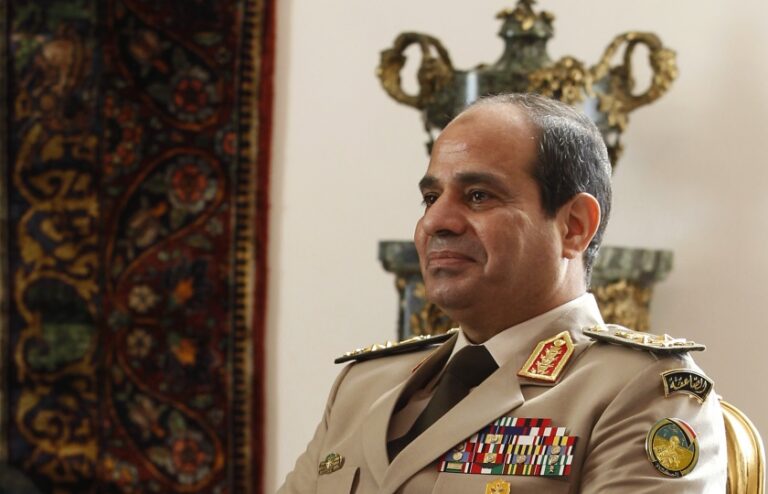A British court has decided to compensate English journalist Jane Cahane with £81,000 for the damages she suffered as a result of being deceived by the chairman of the board of directors of TIJ, which she served as editor-in-chief of for about eight months, before she discovered that it was a propaganda machine for Egypt and the UAE. According to the Guardian, which published coverage of the case, TIJ, which claims to be an investigative journalist website based in London, is headed by the Canadian-Egyptian journalist Mohamed Fahmy, who was imprisoned for nearly two years in Egypt because of his journalistic work, and is now working to serve the UAE and the Egyptian president’s regime.
The UAE and Egypt have recently intensified their campaigns to whitewash their reputations and tarnish their critics, by using press websites and electronic committees abroad, in order to influence global public opinion.
Sisi as the editor
Cahane said that she was the editor-in-chief of the TIJ website between December 2018 and July 2019, after an interview with Fahmy, during which he presented the site as an independent news site, but the journalist soon discovered that the site was receiving funding from the UAE to serve its and Egypt’s interests. In the details of her claim, Cahane confirmed that Fahmy received “aid and guidance” from representatives of the United Arab Emirates, and also met in June 2019 the tyrannical Egyptian President Abdel Fattah Al-Sisi, under whose regime Fahmy was imprisoned, in order to “discuss the editorial line of TIJ and its content.”
The British journalist explained that her job description at TIJ stated that she would “work with senior journalists and a team of editors to help create and manage a top-notch investigative site,” but the reality was different, as the site did not provide any coverage with a diversity of views or an independent point of view. Instead, articles, reports, and social media content he published focused on “aggressive targeting, attacking and defamation of those perceived to be opponents of the United Arab Emirates and the Arab Republic of Egypt, including certain countries such as Turkey, Qatar and Iran, and certain organisations such as the Muslim Brotherhood.” Neither TIJ nor Fahmy presented any defence in the case, so the journalist was awarded £80,735.92 for fraudulent misrepresentation that damaged her and her reputation.
In her written judgment, Judge Fontaine said that “the case was a difficult and sensitive one as it concerned the financing of the press for allegedly political rather than independent purposes, and related to the alleged funding of Middle Eastern countries…The plaintiff’s reputation as an honest journalist was on the line, so she should have been compensated appropriately.” The TIJ website stopped working recently, amid news that the company that owns it is going into liquidation after it was exposed.
Who is Mohamed Fahmy?
Fahmy, who holds both Egyptian and Canadian nationalities, is a former head of Al Jazeera English’s office in Cairo. He was arrested in December 2013, along with other journalists, for what was known at the time as the “Marriott cell.” He was sentenced to seven years in prison on charges of publishing false news and exposing Egyptian national security at risk and support for the Brotherhood, then he was released from prison in September 2015 based on a presidential pardon, after relinquishing Egyptian nationality to take advantage of a legislative amendment that requires the extradition of defendants and the transfer of convicted non-Egyptians to their countries, for trial or execution of the sentence issued against them.
After his release from prison, Fahmy travelled to Canada before his citizenship was returned to him in June 2016, by a decision of the Minister of Interior, at the request of his lawyer. While imprisoned in Cairo, Fahmy received an award from the Canadian Committee on World Press Freedom, and then became a prominent face in the world of journalism, where in 2019 he was invited to speak at the International Conference on Media Freedom of the British Foreign Office. It is believed that Fahmy made a deal with the Sisi regime to release him in exchange for working for him and not attacking him and promoting his policies, and TIJ can be seen in this context.
Whitewashing reputation
Not only did the regime of President Abdel Fattah Al-Sisi control and nationalise the media in Egypt to serve it and serve its interests, but it seems that it has begun to think about changing its image in world public opinion by using international websites.
The matter does not stop there, but also extends to the establishment of electronic committees to promote the Sisi regime and attack its critics and enemies, which was revealed by Facebook, which announced during the last period the closure of hundreds of fake accounts and pages that are electronic committees that serve the goals of the Egyptian regime and attack its critics.
The irony is that all of this is done from the money of the Egyptian people, who suffer from the deterioration of health and educational services, and suffer under the burden of taxes and fees that burden them, and then President Sisi comes after that to confirm that he is “honest” has compassion for these people.





Recent Comments